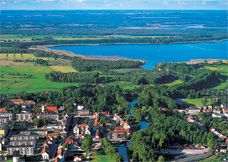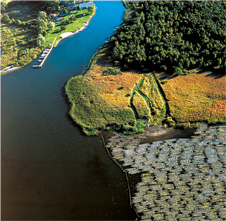|
|
|
|
|
|

|
|
The town is situated at the edge of the Piska Forest at the south-eastern part of the Mazurian Great Lake Land, at the Lake Roś and the Pisa River, flowing out of the lake.
 Pisz is the main town in the region. The name originates from the ancient Prussian language, from the word "pisa", meaning "swamp". The local residents named so their place due to the river of muddy banks flowing out of the Roś Lake. The castle risen above the river was named in turn Johannisburg. The first privilege regarding a settlement around the castle was granted in the year 1367. Pisz gained its civic rights in 1645 and officially received the name of the castle. The local people of Mazury called the castle "Jańsbork", and this name remained until 1946. Pisz is the main town in the region. The name originates from the ancient Prussian language, from the word "pisa", meaning "swamp". The local residents named so their place due to the river of muddy banks flowing out of the Roś Lake. The castle risen above the river was named in turn Johannisburg. The first privilege regarding a settlement around the castle was granted in the year 1367. Pisz gained its civic rights in 1645 and officially received the name of the castle. The local people of Mazury called the castle "Jańsbork", and this name remained until 1946.
Being initially a beekeeper's place, Pisz flourished in the 15th century. Due to its convenient localisation, it was visited by many tradesmen from the south heading towards Gdańsk, and by craftsmen floating their goods by the Pisz to the Narew and the Vistula.
All the historical disasters of Pisz land did not omit the town itself, but in the early 19th century the town redevelops and in 1876 its population reaches 3,000. A railway connection to the towns of Olsztyn and Ełk was set up in 1885, water supply system and gas-works in 1907, and a municipal slaughterhouse in 1913.
 Due to the reach forest areas and shallow deposits of bog iron ore, the industrial traditions of Pisz are connected with wood processing (the sawmill) and metallurgy (the iron works in Wądołek, the industrial smithies in Wiartl and Jaśkowo). later on, especially the wood processing industry developed ? the sawmill of Pisz, turned into Zakłady Przemysłu Sklejek (Plywood Industry Plant) become the core of the industry. Due to the reach forest areas and shallow deposits of bog iron ore, the industrial traditions of Pisz are connected with wood processing (the sawmill) and metallurgy (the iron works in Wądołek, the industrial smithies in Wiartl and Jaśkowo). later on, especially the wood processing industry developed ? the sawmill of Pisz, turned into Zakłady Przemysłu Sklejek (Plywood Industry Plant) become the core of the industry.
Two outstanding people were born in Pisz: Jerzy Pisański (in the 18th century), a scientist, the author of the first history of Prussia, and Gustaw Gizewiusz (19th century), an outstanding Mazurian activist, the author of the renowned work "Polska kwestia językowa w Prusach" ("The Polish Language Issue in Prussia"), a co-redactor of two newspapers published in Polish in the area of Muzury.
The town was rebuilt after the World War II, its population increased from 6,400 in 1939 to 19,375 in February 1992. In the last two years the network of services developed, many new food and industrial goods shops appeared.
|
|
|
|
|
|
 |
|
|